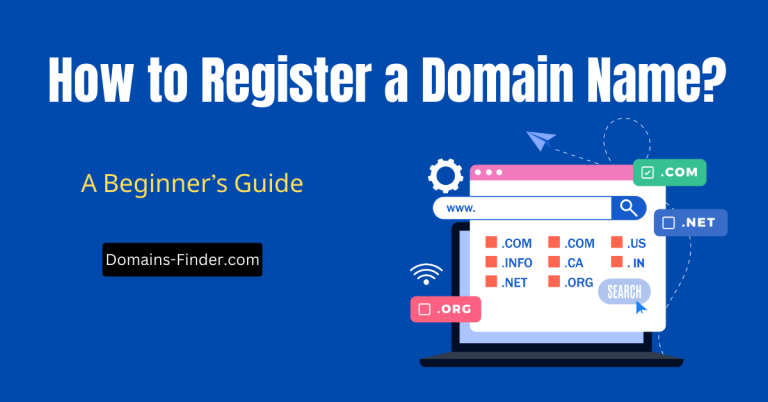Free Domain Name Registrars: How to Get Started Without Spending a Dime
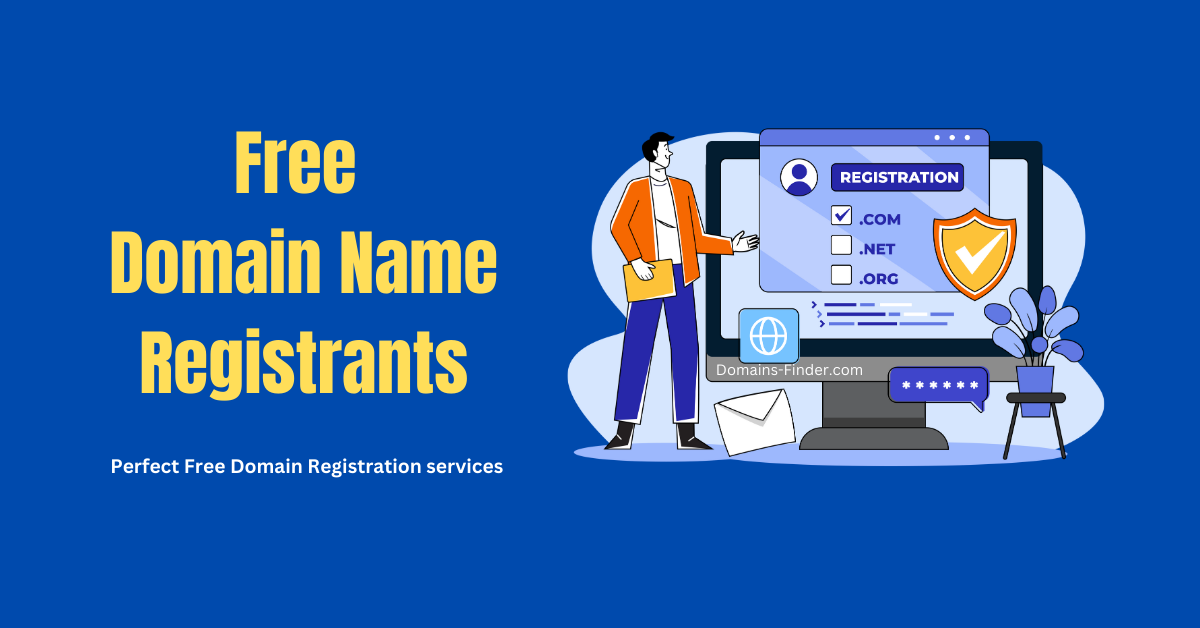
Did you know that you can secure a domain name for your website without spending a cent? That’s right! Free domain name registrars provide an incredible opportunity for startups, bloggers, or anyone looking to establish an online presence without breaking the bank.
In this guide, we’ll dive into the world of free domain name registrars, discussing their benefits, limitations, and the best options available. Whether you’re launching a personal project or testing a business idea, knowing how to navigate these registrars can save you time and money.
What Are Free Domain Name Registrars?
Free domain name registrars are platforms that allow you to register a domain name without any cost. Unlike traditional paid registrars, where you’d typically pay an annual fee, these services often offer basic domain registration for free, making it a budget-friendly option.
However, it’s essential to note that free domains may come with limitations, such as a lack of control over domain management, fewer customization options, and potential advertisements on your website.
Common features of free domain registrars include:
- Simple registration processes.
- Basic customer support.
- Limited domain extensions (TLDs).
- Less flexibility in domain transfers.
What are the Benefits of Using Free Domain Name Registrars?
There are several advantages to utilizing free domain name registrars:
- Cost Savings: The most obvious benefit is saving money. If you’re just starting, free domains allow you to create a web presence without upfront costs.
- Quick and Easy Setup: Most registrars offer straightforward registration processes, letting you get online in no time.
- Testing New Ideas: Free domains are ideal for launching small projects or experimenting with new concepts without financial pressure.
- Use Cases: They work great for personal blogs, portfolio sites, or non-commercial projects where the budget is a concern.
What are the Top Free Domain Name Registrars?
If you’re considering registering a free domain, here are some of the top options available:
1. Freenom
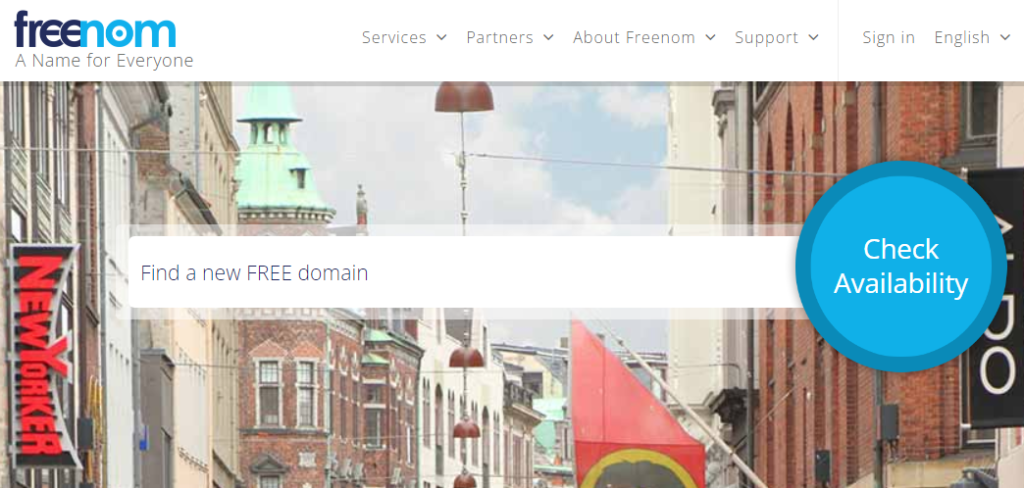
Freenom is a free domain registrar that offers country-code top-level domains (ccTLDs) such as .tk, .ml, .ga, .cf, and .gq. It is one of the few services that allow you to get a domain name without having to pay a dime.
However, there are a few catches. First, you can only register a domain for a year at a time. Second, you cannot use the domain for commercial purposes. Finally, you cannot transfer the domain to another registrar.
Features:
- Free TLDs like .tk, .ml, and .ga (but beware, they might not look very professional).
- Super simple and user-friendly registration process.
- Basic DNS management.
- Options for both free and paid domains.
Pricing:
- Free for select TLDs (though upgrading to a .com or other major TLD will cost you).
- Paid options are available if you want something a bit fancier.
Pros:
- Totally free TLDs.
- Easy to use and quick registration.
- Great for experimenting with side projects.
Cons:
- Free domains might seem sketchy for professional sites.
- Limited customer support.
- The domain is not entirely yours, so Freenom has the right to take it back.
2. InfinityFree
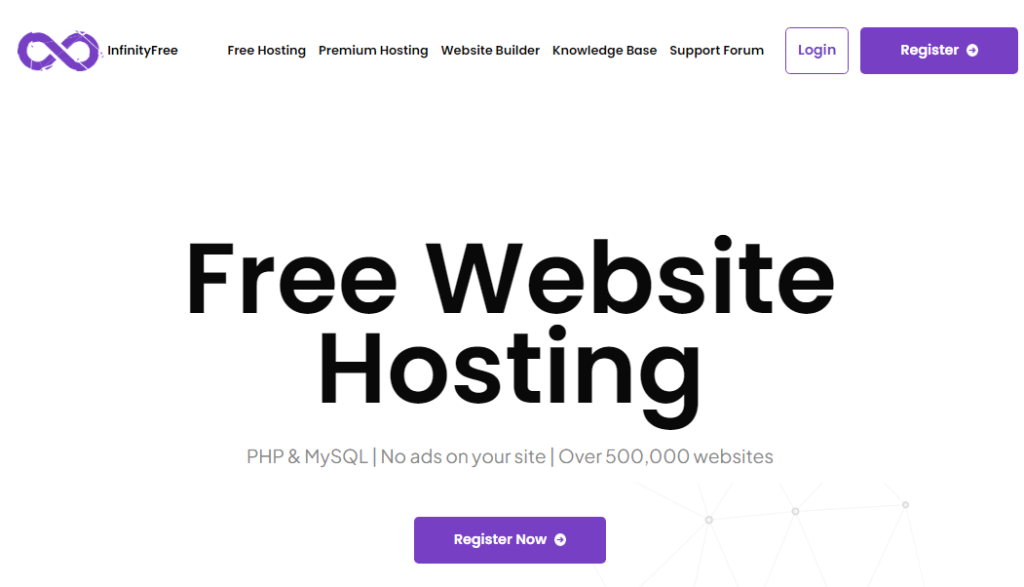
InfinityFree is an excellent option for those who are just getting started with a website, particularly for small personal projects. It provides complimentary domain names and hosting, making it an attractive choice for those on a tight budget.
The free plan includes everything necessary to get started, including MySQL and phpMyAdmin databases, FTP access, and a control panel.
Features:
- Free subdomains.
- Free hosting (with unlimited storage and bandwidth).
- Free SSL certificate for extra security.
- Supports custom domains if you have one.
Pricing:
- The subdomains are free, but no custom domains unless you bring your own.
- Hosting is also free, but paid upgrades are available.
Pros:
- Free hosting + subdomain combo.
- SSL certificate is a nice touch.
- Ideal for beginners or testing new ideas.
Cons:
- Can’t register custom domains directly on the platform.
- Basic service, so not ideal for professional sites.
- No direct domain control like with traditional registrars.
3. AwardSpace
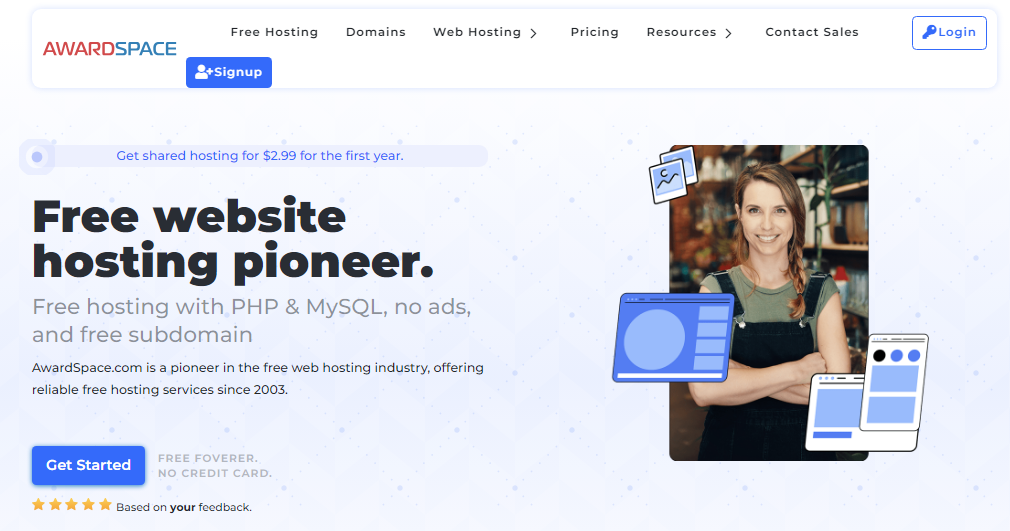
AwardSpace is a popular choice for small businesses and individuals who are just starting out with a website. It offers both hosting and complimentary domains (or, technically, free subdomains). AwardSpace is an excellent choice for beginners because of its ease of use and outstanding customer service.
Features:
- Free hosting with subdomain options (e.g., yoursite.dx.am).
- Free SSL certificate.
- 24/7 support.
- One-click CMS installations (WordPress, Joomla, etc.).
Pricing:
- Free subdomains (with hosting).
- Paid options are available if you want a custom domain.
Pros:
- Free subdomain + hosting package.
- Good for beginners just starting out.
- SSL certificate included for security.
Cons:
- Subdomain (dx.am) doesn’t exactly scream “professional.”
- Limited features compared to paid plans.
- Basic support.
4. WordPress.com
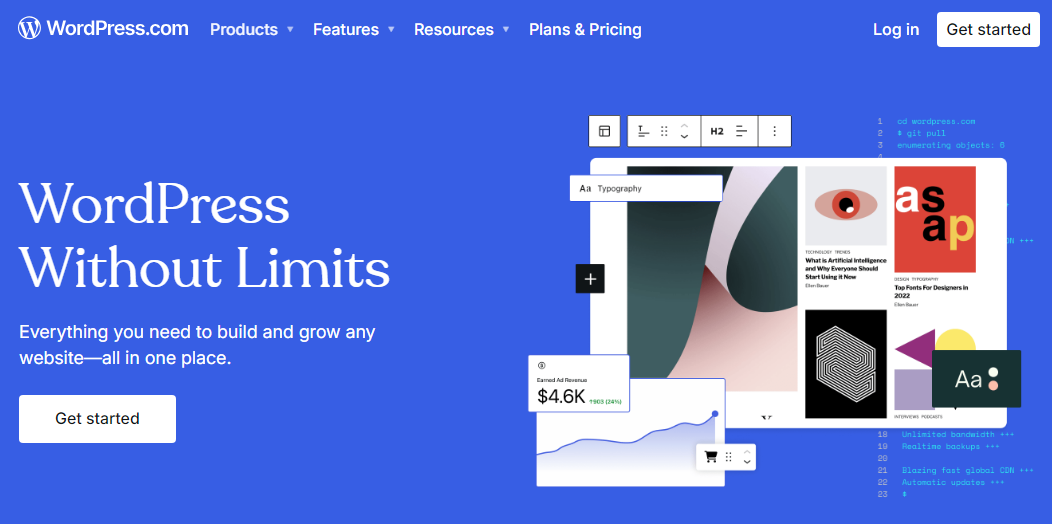
WordPress.com is a popular choice for bloggers because it offers a free subdomain (yourname.wordpress.com). This is an excellent option for personal blogs or side projects. You can also use WordPress.com as a hosting platform for your own domain name.
Features:
- Free subdomain (yourname.wordpress.com).
- Access to a variety of themes and customizations.
- Built-in SEO tools.
- Blogging tools like comments and tags.
Pricing:
- The subdomain is free, but there are paid plans if you want a custom domain or more features.
Pros:
- Great for bloggers or small websites.
- Easy to use and no upfront costs.
- SEO and blogging tools built in.
Cons:
- Free subdomain looks unprofessional.
- Ads will appear on your site unless you upgrade.
- Limited control over your site’s look and feel.
5. Weebly

Weebly is a website builder that offers complimentary subdomains. This makes it simple to create a website without spending any money. Weebly is ideal for small businesses with limited budgets, as well as for personal websites that do not require extensive features.
Features:
- Free subdomain (yourname.weebly.com).
- Drag-and-drop website builder.
- Tons of free themes.
- Built-in eCommerce functionality for small stores.
Pricing:
- Free subdomains are available, but you’ll need to upgrade for a custom domain.
Pros:
- It’s super easy to build a site with the drag-and-drop interface.
- Free eCommerce tools, even on the free plan.
- Perfect for small business websites or personal projects.
Cons:
- Free subdomains don’t look very professional.
- You’ll need to upgrade if you want more advanced features or your own domain.
- Ads might appear on your site unless you pay.
Limitations of Free Domain Name Registrars
While free domain registrars offer several benefits, there are important limitations to consider before opting for a free domain. These limitations can affect your website’s credibility, control, and growth potential. Below are some key issues associated with free domain name registrars:
1. Lack of Professionalism
One of the major drawbacks of using a free domain name registrar is the potential lack of professionalism. Most free domains come with less common Top-Level Domains (TLDs), such as .xyz or .tk, which might not convey the same level of trust as standard TLDs like .com or .org. A domain that looks unprofessional can discourage potential customers or readers, making them question the legitimacy of your website. For businesses, this could negatively impact your brand identity and online reputation.
- Example: A website with a .com domain tends to be perceived as more trustworthy than one with a .freewebsite.tk domain.
2. Restrictions on Features
Another significant limitation of free domain registrars is the restricted access to features. Free domains often come with limitations such as:
- Limited storage and bandwidth: This can hinder your ability to scale your website as traffic grows.
- Lack of SSL certificates: A secure site (https) is essential for both SEO and user trust, but many free registrars do not include an SSL certificate.
- No email hosting: Professional email addresses that match your domain are often unavailable with free domains, which can affect communication and brand consistency.
These feature limitations can significantly restrict your ability to manage and grow your website effectively.
3. Advertising
Free domain name registrars may place unwanted advertisements on your website. These ads are usually out of your control and can disrupt the user experience, making your site appear cluttered and unprofessional. This is particularly problematic for businesses, as intrusive ads can detract from your branding efforts and drive visitors away.
- Impact on user experience: If your website has too many adverts, it could irritate visitors, which would increase the bounce rate and decrease user engagement.
- Loss of revenue: Instead of benefiting from your traffic, the free registrar profits from ad placements on your site.
4. Limited Domain Control
One of the most concerning limitations of using free domain name registrars is the potential loss of full control over your domain. In many cases, the registrar retains ownership of the domain, and you’re simply using it for free. This can limit your ability to:
- Transfer your domain: If you decide to switch to a paid domain registrar, you may not have the option to transfer the domain.
- Monetize your website: Some free domain services restrict your ability to run ads or sell products on your website, making it difficult to generate revenue.
- Modify DNS settings: Free domains often limit your access to advanced DNS management features, which can affect your site’s performance and security.
Without full control over your domain, your website’s future could be in jeopardy, especially if the registrar changes its policies or shuts down.
While free domain name registrars can be an attractive option for individuals or small websites with limited budgets, the limitations in terms of professionalism, features, advertising, and domain control are significant factors to consider. If you’re looking to establish a professional online presence or grow your website over time, it’s worth investing in a paid domain registrar for greater flexibility, credibility, and control.
When to Upgrade to a Paid Domain
As your website grows, the limitations of a free domain name can start to hold you back. Deciding when to upgrade to a paid domain is crucial for the long-term success of your online presence. Below are some key indicators that it’s time to make the switch to a paid domain:
1. Professional Growth
If you’re becoming serious about your website or business, a paid domain can significantly boost your credibility and professionalism. Free domains often come with unusual TLDs (Top-Level Domains) or subdomains, which can appear less trustworthy to visitors. A custom paid domain, especially one with a .com or .org extension, makes your site look more legitimate and credible.
- Improves brand image: A paid domain helps reinforce your brand identity, showing that you’re invested in your website’s long-term growth.
- Builds trust with customers: Users are more likely to trust and engage with a site that has a professional-looking domain name.
2. Access to More Features
Free domain name registrars often come with limited features that can hinder your website’s potential. Paid domains, on the other hand, provide you with a wide range of essential features to improve your site performance and security. Some of the key features include:
- Domain privacy: Protects your personal information by keeping your details hidden from public Whois databases.
- DNS management: Advanced DNS control allows you to optimize your website’s speed and security by managing your domain’s DNS settings.
- Customer support: Paid registrars typically offer 24/7 customer service to help resolve technical issues quickly.
- SSL certificates: Paid domain services often include SSL certificates, which are crucial for HTTPS security and improving SEO rankings.
By upgrading, you’ll gain access to these crucial tools, ensuring that your website can grow and thrive without limitations.
3. Ease of Transfer
Another advantage of switching to a paid domain is the flexibility to transfer your domain to another registrar whenever necessary. Free domain services often lock your domain, making it difficult or even impossible to move your domain elsewhere. With a paid domain, you’ll have more freedom to:
- Change registrars: Easily transfer your domain to a different provider if you find better pricing or services.
- Switch hosting: A paid domain allows you to change your hosting provider without losing control of your domain name.
Upgrading ensures that you’re not tied down to one service and gives you the flexibility to scale and make changes as your needs evolve.
4. Maintaining Control Over Your Domain
With a free domain, you might not have full ownership of your domain name, which means you have limited control over it. Paid domains guarantee complete ownership, giving you the ability to:
- Renew or sell your domain: Full ownership allows you to renew the domain as needed or even sell it if it becomes valuable.
- Secure your brand: By owning your domain, you can prevent others from registering similar names and protect your brand from competitors or scammers.
- Monetize your website: Paid domains allow you to fully monetize your site by running ads, affiliate programs, or eCommerce features.
Having full control over your domain is critical for maintaining your online identity and ensuring your site remains active and profitable.
Upgrading to a paid domain offers a wide array of benefits that free domains simply cannot provide. From enhancing your professional image and unlocking essential features to giving you greater control and the flexibility to transfer your domain, the investment in a paid domain is well worth it as your website grows.
A paid domain name not only ensures you maintain full control of your online identity, but it also positions your site for long-term success and credibility.
Frequently Asked Questions (FAQS)
Can I get a completely free domain name with no hidden costs?
Yes, it’s possible to get a free domain name through services like Freenom, InfinityFree, and AwardSpace. However, there are usually limitations, such as using a subdomain (e.g., yoursite.wordpress.com or yoursite.weebly.com) or using less common TLDs (like .tk, .ml, etc.). Completely free domains often come with fewer features and may not convey the same professionalism as paid domains. Always check if there are any hidden fees, especially when it comes to renewals or domain transfers.
What are the risks of using a free domain name registrar?
Free domain name registrars can come with a few risks:
1. Lack of ownership: Some free registrars retain control over the domain, meaning it could be reclaimed or taken down if their terms are violated.
2. Limited credibility: Free domain extensions (e.g., .tk, .ml) may not seem as trustworthy to visitors compared to paid domains like .com or .org.
3. Ads: Many free domain services display ads on your site, which can detract from your website’s user experience.
4. Fewer features: Free plans often come with limited tools, features, and customer support, making it harder to grow your site.
Is a free domain name good for a business website?
A free domain name is suitable for personal projects, testing ideas, or blogs, but it may not be ideal for a business website. Free domain extensions (like .tk, .ga) or subdomains (like yourname.wordpress.com) may look unprofessional, potentially harming your brand’s credibility. If you’re running a business or an eCommerce site, investing in a paid domain name will help build trust with customers and give you more control over your online presence.
Can I upgrade from a free domain to a paid one later?
Yes, most free domain name registrars offer the option to upgrade to a paid domain at any time. Many platforms allow you to transfer your website to a custom domain (e.g., yoursite.com) while retaining your site’s content. However, this upgrade usually comes with a cost, and some free domain services may have restrictions on transferring domains to other registrars. It’s always a good idea to check their transfer policies before signing up.
Are free domain name registrars SEO-friendly?
Free domain names, especially subdomains (e.g., yoursite.wordpress.com), can make it harder to rank well on search engines like Google. While it’s possible to optimize a free domain for SEO, having a paid domain (like yoursite.com) is generally more SEO-friendly because it looks more credible and professional to both users and search engines. Free domains also often lack advanced SEO features, such as full access to DNS settings or the ability to create a custom email address for branding purposes.
Final words on Domain Name Registrars
Using free domain name registrars is a great option for beginners or those looking to experiment with new ideas without any upfront costs. Whether you are launching a personal blog, a hobby site, or just want to test the waters of the online world, these services offer a valuable entry point. The benefits of free domains include no-cost registration and the ability to establish a web presence quickly. However, as your website grows and you aim for a more professional appearance, upgrading to a paid domain becomes important for establishing credibility, improving search engine ranking, and gaining access to advanced features.
It’s essential to understand the limitations of free domain services. Free domain extensions or subdomains may not convey the same level of professionalism as paid domains. Moreover, some registrars may retain control over your domain, meaning it could be reclaimed or suspended if you violate their terms. Additionally, free domains often come with ads or limited customer support, which can negatively impact the user experience.
For anyone who is serious about building a professional online presence—whether for a personal brand, blog, or business—transferring to a paid domain name offers long-term benefits. You gain ownership of a domain, remove ads, and access features like custom email addresses, enhanced SEO tools, and stronger brand identity.
Ultimately, choosing the right free domain registrar depends on your goals. If you’re launching a small project or personal website, these platforms can be a good fit. But as your online presence grows, it’s worth investing in a domain that aligns with your long-term plans.
Have you ever tried a free domain name registrar? What was your experience? Share your thoughts and tips in the comments below—your input might help others make an informed decision!
Discover more from Domains Finder
Subscribe to get the latest posts sent to your email.
